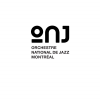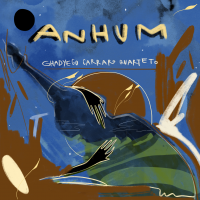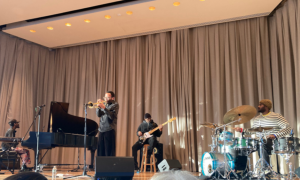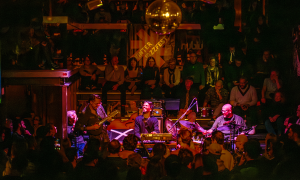Home » Jazz Articles » Live Review » Oregon in Montreal, February 22, 2007
Oregon in Montreal, February 22, 2007
The Spectrum
Montreal, Canada
February 22, 2007
Ask any artist who has performed there and they'll tell you that Montreal audiences are something special. Nowhere was this more evident than on Thursday, February 22, 2007, when the stylistically genre-busting group Oregon made its first visit to the Canadian jazz mecca in over 15 years. When the 37-year-old group took to the stage at Montreal's The Spectrum, the applause, hoots and hollers were so loud and persistent that it was nearly five minutes before the group was able to settle into its first tune, the relaxed and pastoral "If, " from Prime (Cam Jazz, 2005).
Few groups have had as stable a line-up as Oregon for so many years. Guitarist/keyboardist Ralph Towner, bassist Glen Moore and woodwind multi-instrumentalist Paul McCandless have been playing with each other for the majority of their adult lives, first coming together with original sitarist/percussionist Collin Walcott in saxophonist Paul Winter's late-'60s group Consort. Walcott died tragically in a car accident while the group was on tour in Europe in 1984, and though the group worked both with and without a percussionist in the immediately ensuing years, Mark Walker has now been filling the percussion chair for over a decade. He's long past being the new kid on the block and is now an integral part of the chemistry that has made Oregon special from the very start.
When Oregon first emerged, its disregard for musical boundaries was fresh and unparalleled. Playing world music before the term was even coined, Oregon created a new amalgam of classical and jazz forms that blended in folk musics from around the world with a distinctive harmonic language. From the very beginning the group traversed a broad musical spectrum with detailed composition at one end and free improvisation at the other. A deep simpatico often made free improvisation sound like anything but unstructured extemporization. In its early days the group was completely acoustic, combining Towner's unique pianistic approach on twelve-string and classical guitars with Walcott's sitar and handmade percussion, McCandless' oboe, English horn and bass clarinet and Moore's warm bass.
Some things have changed while others have stayed the same. In the early '80s Towner began to bring synthesizers into the fold, altering and expanding the group's textural possibilities. These days, along with the grand piano provided by the venue, he travels with a classical guitar, a keyboard synth and an unusual-looking frame guitar that allows him to work with more expansive textures on the six-stringed instrument. McCandless' arsenal of woodwinds has grown to include all manner of wood and tin flutes, soprano and sopranino saxophones and, recently, tenor. Unlike Walcott, Walker has a traditional drum kit, but he also has an array of hand percussion, and can often be heard combining the two in ways that sound multi-tracked on record but, in performance, are surprisingly revealed as real-time executions by a player whose rhythmic facility is so advanced that he can keep time on a shaker with one hand while executing press rolls on a snare with the other.
Oregon's two-hour set was a balanced mix of older, well-known tunes, compositions from recent albums, and a couple of new pieces from their forthcoming Cam Jazz release, 1,000 Kilometers. Towner's "Distant Hills (first heard on Oregon's 1973 Vanguard album of the same name) received a sonic update and new parts, with his synth keyboard carrying the sequencer-generated arpeggiated changes, freeing the versatile instrumentalist to improvise on classical guitar. Towner's approach to the classical guitar remains one of the most distinctive in modern jazz, an almost call-and-response dialog during which he regularly jumps from a melodic phrase in the instrument's upper range to an equally lyrical one at the lower end. His unmistakable voicings are one of the defining characteristics of the Oregon sound.
Towner's unique approach and dominance on guitar can, at times, overshadow his strengths as a pianist. When "The Glide was originally released on Crossing (ECM, 1985), it was the first hint that, while Oregon was anything but a mainstream group, it could swing with the best of them, but in its own way. In performance Towner's spare accompaniment and soloing suggest clear roots in Bill Evans, but equally a personally evolved, individual style that remains compelling in its construction.
When McCandless first emerged on the scene he set the stage for others to bring double reed instruments into an improvising context. Live, his remarkable technique never overshadows his strength as a solo player whose primary concern is creating a narrative. His circular breathing on "Distant Hills permitted seamless phrasing, drawing no attention to itself until one realized that he'd been playing a phrase or holding a single note uninterrupted for well over a minute. McCandless' less conventional instruments have always been a fundamental part of Oregon's complexion, but one of his most impressive and exciting solos of the night was on Towner's "Doff. The tenor saxophone may be a relatively new addition for McCandless, but he's as accomplished on it as he is on instruments he's been playing for far more years.
An unshakable anchor throughout, when it came time to the one non-Towner piece of the evening (not including a collective improv that led into "Doff ), Moore made a strong case for an artist's music reflecting his personality. A lighthearted jokester, Moore's own "Hoedown was an extended and often comical duet with Walker that found the two musically joined at the hip. Moore's writing has always been idiosyncratic and often humorous in a skewed away while remaining unequivocally thematic. With a hummable melody book-ending the tune, the improvised core of "Hoedown was the definition of democratic interplay and musical conversation. Moore utilizes a variety of innovative bass playing techniques that defy description when heard on record but become much clearer when seen in performance.
It's infectious to see that a group this long in the tooth can still have so much fun together. Everyone was clearly having a great time, and the eye contact—whether acknowledging a passing phrase, accent or groove—closed the distance between group and audience. Walker's ability to make quick choices with respect to using the kit and/or hand percussion brought new life to older tunes like Towner's "Redial, from Ecotopia (ECM, 1987).
Ending the set with the energetic and uplifting "Doff, the group left no question about an encore as the audience gave a well- deserved standing ovation, clapping, whistling and hollering so loudly that the musicians were clearly taken aback. Still a regular part of the repertoire after nearly 35 years, Jim Pepper's classic "Witchi-Tai-To continues to inspire fresh and compelling musical rhetoric. The group has recorded the tune many times over the years—first on Winter Light (Vanguard, 1974), then on Out of the Woods (Elektra, 1978) and, most recently, on Live at Yoshi's (Intuition, 2002)—but its ability to honor the tune's spirit while interpreting it anew each time is demonstrative of both its uncanny telepathy and its open-ended yet focused approach to everything it plays.
But one encore just wasn't enough. The enthusiastic audience simply would not let Oregon leave without one more tune—Towner's gentle "Green and Golden from Beyond Words (Chesky, 1995). It was the perfect ending to an evening on which Montreal's loud and clear message was that Oregon must not wait this long to return again. Based on the group's equally enthusiastic response to the audience, it's a sure bet they got the message and will be coming back again—soon.
Tags
About Oregon
Instrument: Band / ensemble / orchestra
PREVIOUS / NEXT
Support All About Jazz
 All About Jazz has been a pillar of jazz since 1995, championing it as an art form and, more importantly, supporting the musicians who make it. Our enduring commitment has made "AAJ" one of the most culturally important websites of its kind, read by hundreds of thousands of fans, musicians and industry figures every month.
All About Jazz has been a pillar of jazz since 1995, championing it as an art form and, more importantly, supporting the musicians who make it. Our enduring commitment has made "AAJ" one of the most culturally important websites of its kind, read by hundreds of thousands of fans, musicians and industry figures every month.
Go Ad Free!
To maintain our platform while developing new means to foster jazz discovery and connectivity, we need your help. You can become a sustaining member for as little as $20 and in return, we'll immediately hide those pesky ads plus provide access to future articles for a full year. This winning combination vastly improves your AAJ experience and allow us to vigorously build on the pioneering work we first started in 1995. So enjoy an ad-free AAJ experience and help us remain a positive beacon for jazz by making a donation today.Near
Montreal Concerts
Mar
12
Thu






























